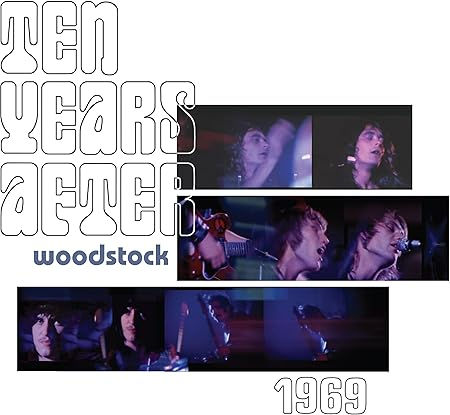Ten Years After — Woodstock 1969
- rozanski0
- Sep 9, 2024
- 4 min read

Only an hour was needed. And the crowd went wild.
It was 8:15 p.m. on a late-summer’s evening in upstate New York. By 9:15, Ten Years After—the British blues-rock outfit powered by the rocket fuel that was Alvin Lee’s scorchingly fast fretsmanship—came, saw and famously conquered. On August 17, 1969, a couple hundred-thousand onlookers at the Woodstock Music & Art Fair (aka Festival) were treated to a show of firepower erupting between the sets of Country Joe & the Fish and The Band. Ten Years After made their indelible mark on that Sunday, turning heads and dropping jaws en masse, winning over America. It would not be their last time doing so.
They opened with “Spoonful,” the Howlin’ Wolf blues about obsession (unless you trace it further back to Charley Patton’s 1929 “A Spoonful Blues”). The studio version residing on their 1967 self-titled debut was but a husk of what appeared on the stage. Here, the song is a beast, having gained tremendous force and moxie. Sloshing in between the deep swells of Leo Lyons’ bassline, Alvin sneers out those classic words harpooning the price paid for cravings (diamonds to coffee to you name it), as the rhythm throbs and lurches headlong: a wrecking ball with a steady, visceral swing.
The process continues, as old blues keep getting rewired for young, rock-starved ears. “Good Morning Little Schoolgirl”—historically feasted upon by everyone from Muddy to Buddy, Taj to Hooker, the Allmans to the Dead—follows suit. But in the eight collective hands of Ten Years After, harpist Sonny Boy Williamson I’s desirous inquiry (“Can I go home with you?”) roars like never dreamed in 1937. The signature riff, typically skipping along, is now jackhammered and given a big bang by drummer Ric Lee; the lyrics’ once-veiled intent is clarified without mincing words; the guitar aria confirms this as blues for the Marshall-stack generation.
“I Can’t Keep from Crying Sometimes” starts innocently enough, rocking gently back and forth on a relaxed riff. Beware, though: It is a slow reveal that found room for expansion, elongating to more than three times its length as when confined in the studio (1967’s Ten Years After, again). And also know that this song has history, evolving over the years to fit its surroundings at the time: Blind Willie Johnson tore up his throat and a bottlenecked guitar at 78 rpm over “Lord, I Just Can’t Keep from Crying” in 1928. Then, Al Kooper performed a slight rename and a total redesign—personal and psychedelic—as track 1, side 1 on Blues Project’s 1966 Projections LP. Upon Kooper’s scaffolding, Ten Years After constructed their onstage epic, ’69 style. The four of them come at it in their own way: Alvin, exploring; Leo, charging; Ric, bashing; Chick Churchill, riffing on Hammond organ. They wax and wane through multiple phases: loose and free, escalating with a high fever, thinning down, re-detonating, bludgeoning the beat for a bit, climaxing in a flurry of chaos to show competitors that they, too, can freak out. As professional courtesy, Cream’s “Sunshine of Your Love” even gets a quick, passing nod at one point, an index of its clout. An 18-minute adventure passing through periods of pindrop-to-hurricane dynamics.
Which then begs the question: From where, exactly, is that ferocious whoosh throughout this six-song set coming? (Yes, even including the intro and outro to “The Hobbit,” an extended drum solo—a concussive sign of the times—built upon rolling tom-tom thunder and glazed with bronze cymbal splash.) The source is Lee’s iconic 1959 Gibson ES-335, named “Big Red” and instantly identified by an array of colorful stickers adorning its semi-hollow body. They made quite the team: Nottingham, England’s elite daredevil axman with profoundly flying fingers, and a customized cherry-red guitar conducive to letting those fingers fly.
For white knuckles, fly “Help Me.” Yes, Sonny Boy II’s slinky trot—except hot-rodded as a spectacle of breakneck chops, physical endurance and endless improvisation. But the 15 minutes also serve as a study in contrasts. The tempo is surly and defiantly unhurried, yet Lee’s phenomenal marathon solo savors tension and bullets out a blizzard of blue, bent and blurred notes, as if John Coltrane had converted to a guitarist. The combination makes for a slow blues with paradoxical blinding velocity. Shredding, before there was such a thing as shredding. How Lee avoids a friction fire on the fretboard is a miracle. Because, with thrusters fully engaged, Captain Speedfingers burns rocket fuel, for sure.
Yet, from among all the highlights, “I’m Going Home” became the shot heard ’round the world, having burned its way onto the 1970 Woodstock documentary film as well as its accompanying soundtrack. The hyper-boogie encore is, in part, a rock ’n’ roll revue, absorbing snips of Carl Perkins to Jerry Lee Lewis into its own manic panic. (How manic? Seek out the concert footage to witness Lyons’ signature headbanging, full-body spasms on bass.) The actual ending manages to ratchet up all the higher before ultimately crash landing. Yet again, another massive audience ovation … fade to black.
One year later, Ten Years After fired up a few hundred-thousand more at the Isle of Wight Festival. A year after that, the band once again won over bulk American audiences, owning the airwaves with “I’d Love to Change the World,” the lead single from their 1971 A Space in Time. Not long after that, Alvin Lee peeled off from the band—for the first time—as part of an on-again, off-again relationship.
All of which is a long-winded way of saying that Woodstock 1969—newly restored with fresh mixes from the original 2-inch multitrack tapes and available for the first time as a standalone release—is actually a time capsule, packed to the gills with an hour’s worth of awe and adrenaline.
Label: Chrysalis
Release Date: 8/16/24
Artist Website: ten-years-after.com
Reviewed by Dennis Rozanski

Comments